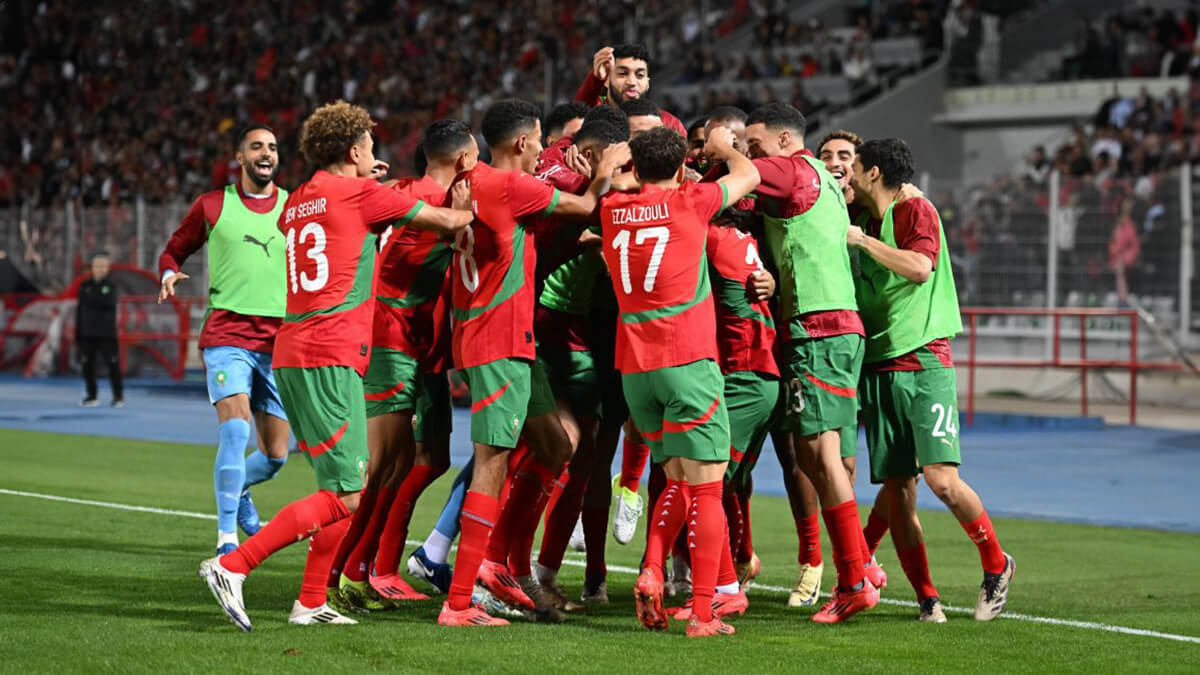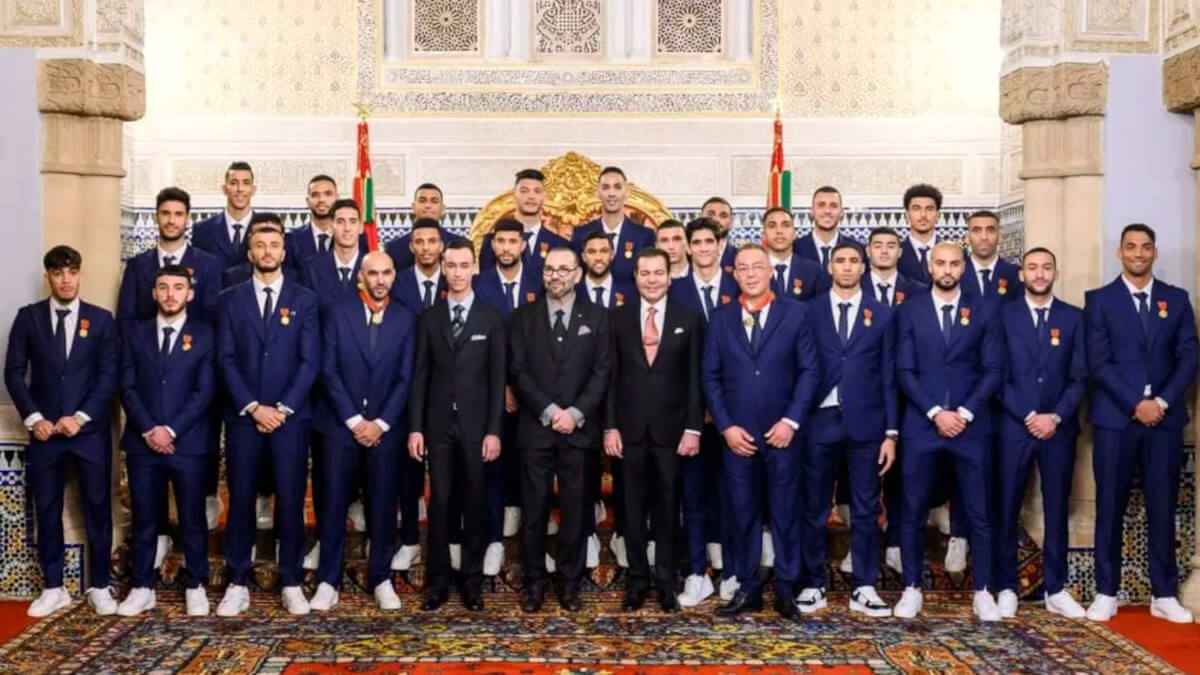Morocco, contenders for everything

In recent years, the milestones achieved by Moroccan football highlight the efforts and perseverance of the Royal Court, the Ministry of Education and Sports, and the Moroccan Football Federation (FRFM), while showing the progress that Moroccan sport is experiencing at all levels.

Over the years, the administration has devoted a great deal of effort to the development of sport and its values such as respect, discipline, tolerance, the spirit of self-improvement and teamwork. Morocco is a country that has had great sporting achievements throughout its history, but it was not until well into the 21st century that its enormous footballing potential stood out from its competitors.
The scope, significance, weight and magnitude of Moroccan sport is the result of years of hard work. One of the keys to success is, according to the president of the FRFM, Fouzi Lekjaa, ‘to weave a sporting structure that brings prestige and much greater success in the long term’.
In this context, we will analyse Morocco's role in the organisation of the 2025 African Cup of Nations (CAN) and the 2030 Football World Cup (WC); how it is approaching the next editions of both tournaments; the importance of the Mohammed VI Football Academy in this progress; the golden generation of Moroccan players; and the challenges facing sport and, in particular, Moroccan football.
Football World Cup 2030
‘I hereby notify your Assembly that the Kingdom of Morocco has decided, together with Spain and Portugal, to submit a joint bid to host the 2030 World Cup,’ announced the Moroccan monarch, Mohammed VI, in a message read out by the Minister of Education and Sport, Chakib Benmoussa.
These statements will undoubtedly have a place in Moroccan football history. Although sports fans have been aware of Morocco's potential since 2022, hosting ‘the most watched competition on the planet’ is one of the most important accolades that any federation in the world of football can receive.
Such is the magnitude with which Morocco has burst onto the scene that, pending the announcement of the venue for the World Cup final, the mere fact of disputing the ‘throne’ with stadiums such as the Santiago Bernabeu and the Nou Camp Nou could be considered a great triumph. The keys to Morocco's selection as host were its performance and involvement in the advancement of sporting values and the construction of world-class facilities and infrastructure.
Among the facilities is the Hassan II Grand Stadium in Casablanca, which will be the jewel in the crown. With more than 115,000 spectators, the Hassan II Stadium will be the largest capacity stadium of all the potential host cities, and the largest in Africa. The design is inspired by the large traditional Moroccan tents or marquees that are set up during large events or traditional social gatherings known as Moussem.
In addition to positioning Morocco in the eyes of the world, the hosting of the World Cup will provide the North African country with large tourism revenues and an influx of investors who will introduce the country to millions of tourists from all over the world.
Achievements and challenges
Morocco's achievements go beyond victories. Since the king, Mohammed VI, implemented a plan in 2017 to promote sport, including football, there have been significant improvements in terms of sporting standards and high-level infrastructure. As a result, Morocco has hosted and will host several international football tournaments from 2017 to 2030.
In 2018, the country hosted the CAF Women's Africa Cup of Nations CAF 2018, also called WAFCON 2018, which was held from 17 November to 1 December 2018. The 2019 FIFA U-20 World Cup took place in Morocco from 20 May to 9 June. In 2022, they hosted the CAF Africa Cup of Nations 2022, which took place from 13 January to 6 February of the same year.
In 2025, the country will host two major sporting events: the CAF Africa Cup of Nations, from 21 December 2025 to 18 January 2026; and the FIFA U-20 World Cup, scheduled from 16 May to 9 June.
In 2026, Morocco will host the CAF Women's Africa Cup of Nations CAF 2026, also called WAFCON 2026, from 3 to 24 July. In 2030, the country will host the FIFA World Cup, which will take place from 8 June to 8 July.
Golden Generation
If there is one reason why Morocco is among the best, it is because it has great players in all positions, including coaching. With big stars at the best clubs in the world, a solid base and a great coaching staff, Morocco has everything to fight for the Africa Cup of Nations and, who knows, even the World Cup.
Players such as Brahim Diaz, Real Madrid striker; Eliesse Ben Seghir, Monaco striker; Achraf Hakimi, Paris Saint-Germain defender; Soufiane Rahimi, Al-Ain striker; En-Nesyri, Fenerbahce striker; and Yassine Bono, Al-Hilal goalkeeper, are all part of the Atlas Lions' squad that coach Walid Regragui wants to keep.
Players who are undoubtedly forming a unique generation in African football. The blend of veteran and young talent has helped the FRFM to win the bronze medal at the Paris 2024 Olympic Games, to become champions of the African Nations Championship in 2018 and 2020, and to finish fourth at the Qatar 2022 World Cup. But nothing would be possible without Walid Regragui's coaching staff.
From most to least important, we have Brahim Diaz in first place. The Real Madrid star player, after rejecting the call of the Spanish coach, Luis De la Fuente, opted to go with the Moroccan team with whom, since his debut, he has proved his level by scoring 7 goals, 5 of them in the last two games, in the 8 matches he has played.
A front line in which also plays the new promise of Moroccan football: Eliesse Ben Seghir. Born in France, but of Moroccan descent, the Monaco star has burst onto the scene in a way no one else has ever done before. At 18, he already has an Olympic bronze medal, 11 caps and three goals to his name, making him the youngest goalscorer in the history of the Atlas Lions.
Alongside them are two of the team's most charismatic players, Soufiane Rahimi and star striker Ayoub El Kaabi, who at 31 is living a ‘second youth’ at the helm of the best Moroccan national team of all time.
Al-Ain striker Soufiane Rahimi is one of the players with the most appearances for the national team before the age of 23, while El Kaabi is the trendy striker in the Greek league where he has 12 goals/assists in 12 games and four goals in four games in European competitions, as well as being the third highest scorer in the history of the national team, 11 goals behind the historic Ahmed Faras, one of the members of the team that won the 1976 Africa Cup of Nations in Ethiopia.
In addition to the attacking players, the Moroccan team has a midfield that perfectly combines defensive sacrifice with quick transitions. At a time when the opportunities of the past are no longer available to players who can make the difference due to improved tactics, players like Onuahi, one of Africa's best one-touch players, have an essential role to play in the current model of the game.
Add to this the great footwork of goalkeeper Yassine Bono and centre-backs Nayef Aguerd, a Real Sociedad defender, and Jamal Harkass, a Moroccan Wydad defender, and Regragui's side are undoubtedly one of the main teams to beat.
Mohammed VI Football Academy
Many of these players made history with Morocco by reaching the semi-finals of the Qatar 2022 World Cup, the first African team to do so. A milestone that was achieved thanks to the Mohammed VI Football Academy. This sports centre has been and is key to the success of African football, training great Moroccan stars and being a determining factor in this unparalleled achievement.
Since it was founded in 2010, the academy has hosted great stars who have shone in Qatar. These include Turkish Fenerbahce striker Youssef En-Nesyri, Greek Panathinaikos midfielder Azzedine Ounahi and Spanish Real Sociedad defender Nayef Aguerd.
In addition, the Mohammed VI Complex, inaugurated in 2019 and covering 29 hectares, involved an investment of 630 million dirhams. The facilities, which meet FIFA standards, include residences for the senior national team, as well as the U-23 and U-17 teams, four natural grass football pitches, three artificial turf pitches and one futsal pitch, among others.
In addition to the incentive of being at home in an international competition where you are representing your country, the Moroccan national team is the fittest national team going into the 2025 Africa Cup of Nations and the 2026 World Cup qualifier.
Counting their matches by wins, the Atlas Lions have completed an unbeatable Africa Cup of Nations qualifiers. The team coached by Walid Regragui has obtained 21 out of a possible 21 points, has been the highest scoring team (26 goals) and the lowest scoring team (2 goals), has the best player and top scorer of the tournament (Brahim Diaz with 7 goals), with 5 players in the ideal eleven of the qualifying phase, and with 9 players in the top 25.
Having lost only one match out of the last 20, Morocco is, along with Spain and Argentina, the third team with the best form, which invites fans to dream of a possible title in Casablanca on 18 January 2026.
